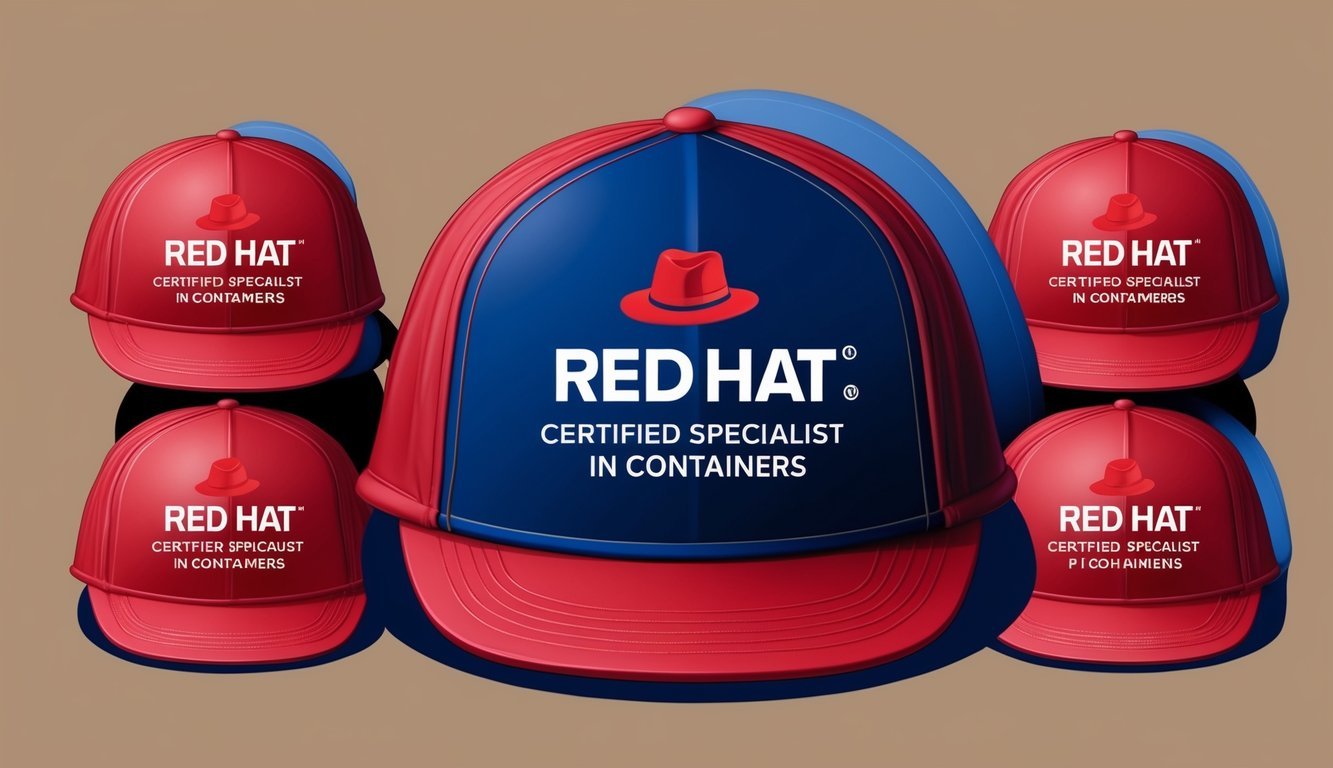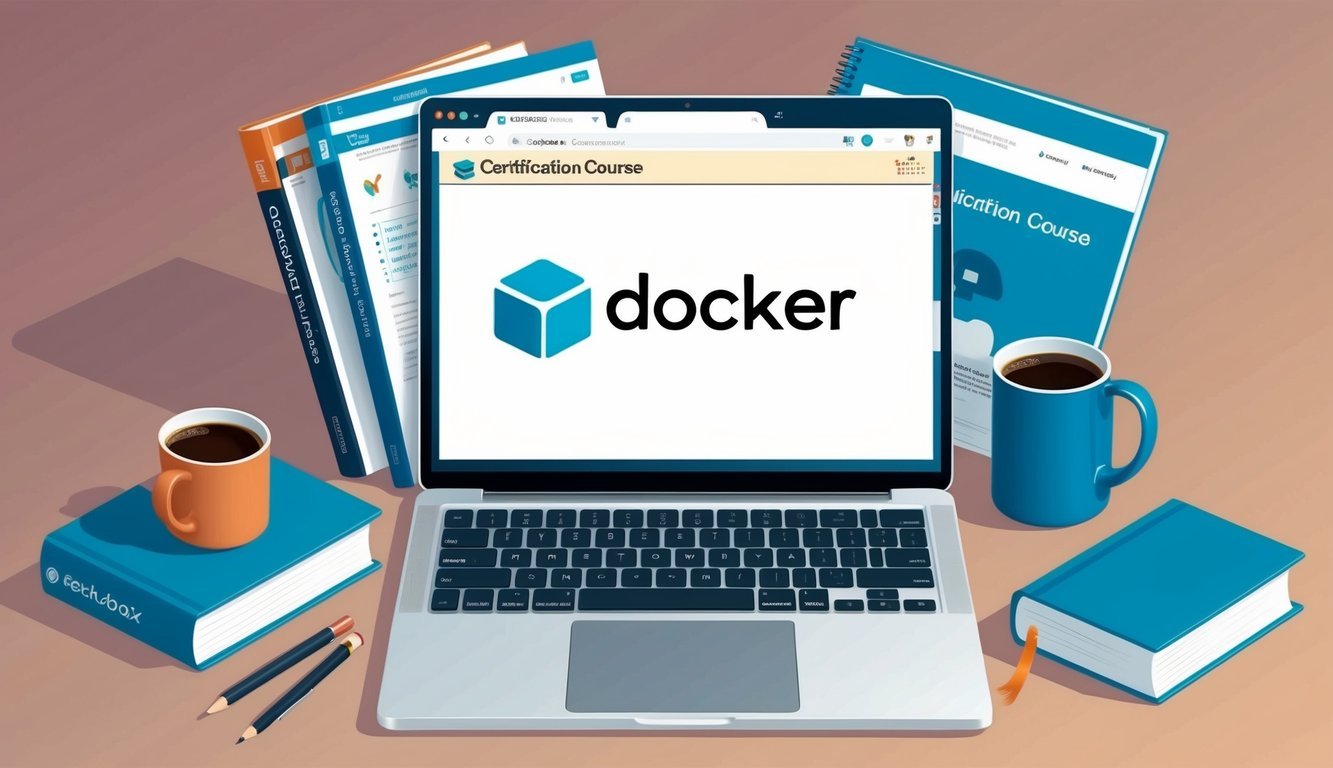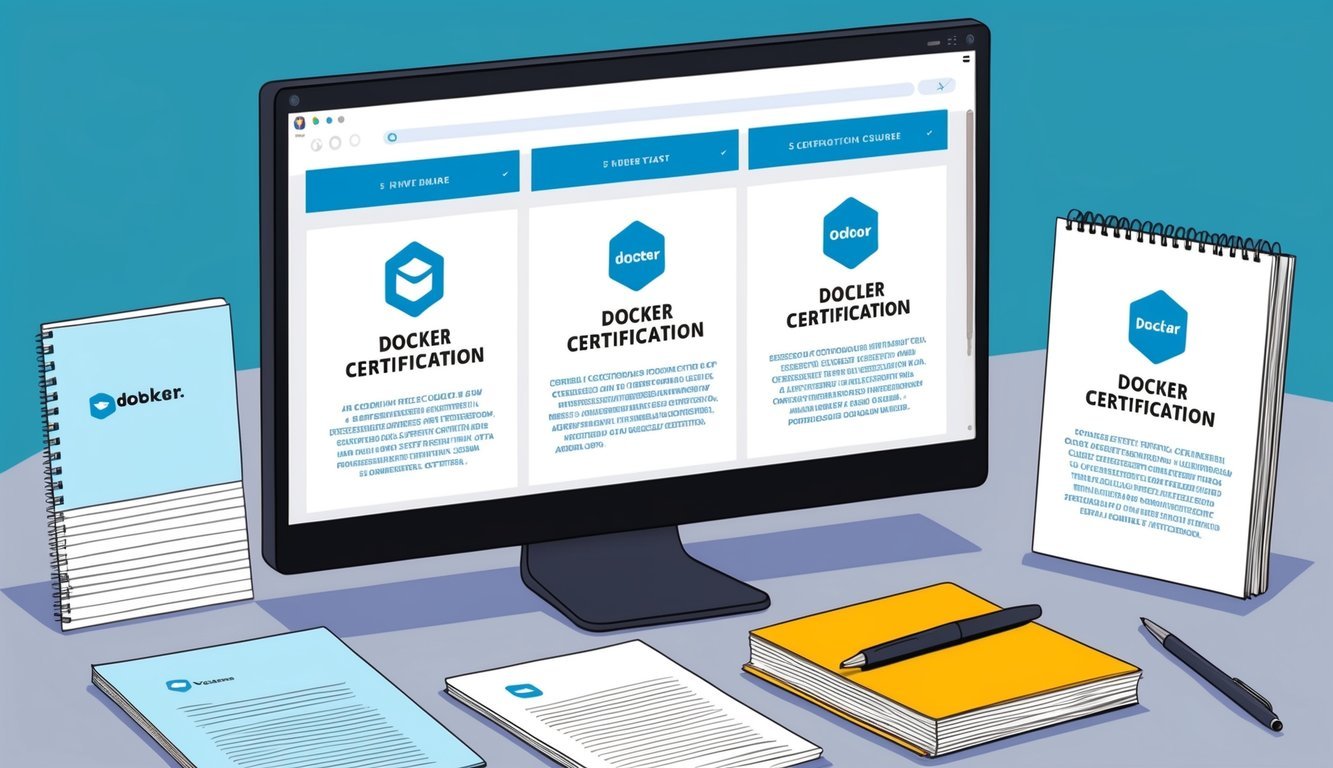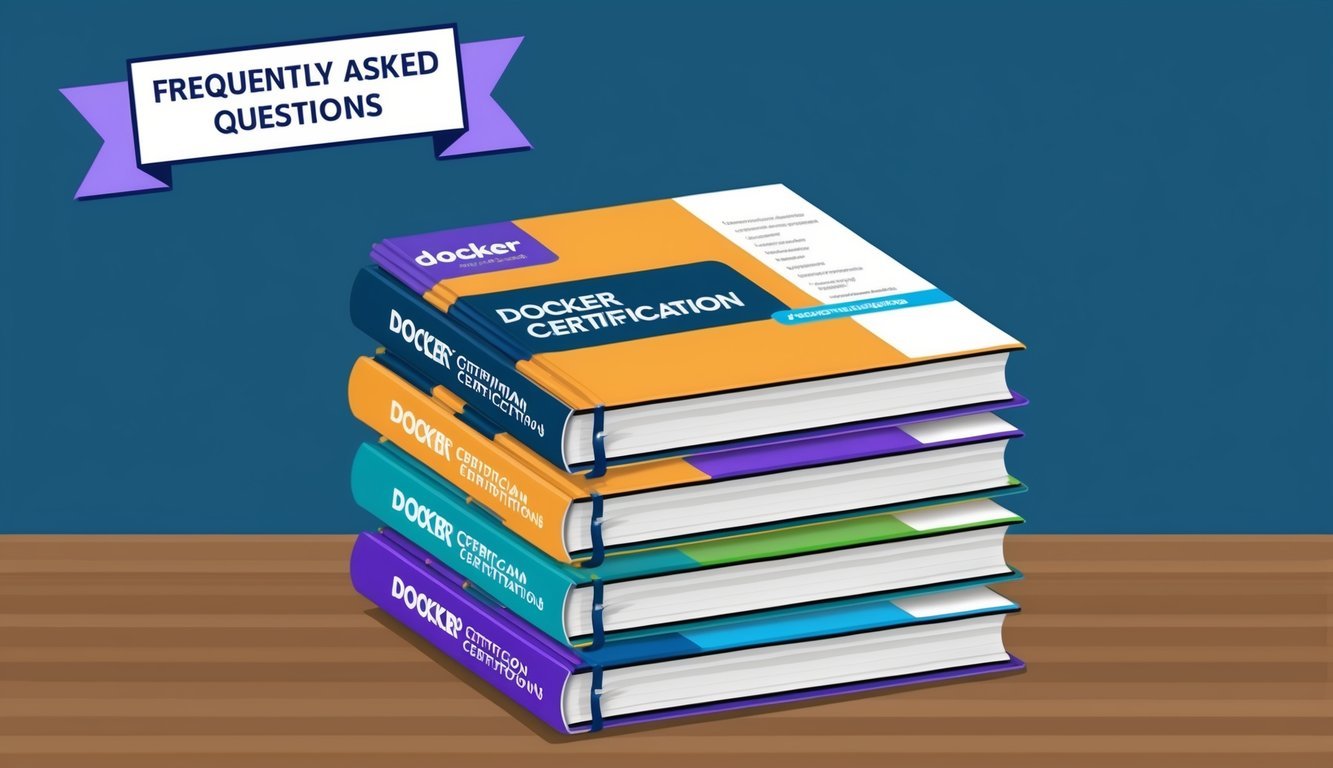If you’ve been paying attention to the tech scene lately, you know Docker skills are all the rage.
More and more companies are hopping on the container train, and guess what? They’re on the lookout for folks who can handle them like pros.
Want to set yourself apart in this job market? Getting certified in Docker is a smart move.

Taking a Docker certification course can seriously boost your career and help you shine brighter than other candidates. These courses break down everything you need to know about Docker, from the basics to some pretty clever tricks.
You’ll learn how to build, ship, and run apps in containers like it’s second nature.
Ready to see some of the best Docker certification courses you could jump into in 2024? Let’s get into it!
1) Docker Mastery: With Kubernetes
If you’re itching to learn Docker and Kubernetes from a seasoned pro, take a look at the Docker Mastery course.
It’s led by a Docker Captain, which is pretty cool because you’ll be getting top-notch insights from the best in the business.
This course walks you through all the essentials of Docker.
You’ll be spinning up and running containers in no time.
But hang on, it gets even better—you’ll also get to dive into Kubernetes, which is a big deal for managing containers when you’re scaling up.
The cherry on top? You’ll join a massive community of learners.
Imagine chatting with over 50,000 other curious minds, tossing around questions and getting answers in real-time.
Get ready to roll up your sleeves with hands-on projects that are more than just textbook stuff.
You’ll gain actual experience setting up development environments using containers.
This course also dives into Swarm and Kubernetes clusters.
These tools are essential for server deployments.
Plus, you’ll get to use the official Docker tools, which means you’ll be armed with in-demand skills.
Remember, Docker skills are all the buzz right now.
This course could be your ticket to standing out in the bustling job market.
And the best part? It’s constantly updated to cover the latest Docker and Kubernetes features.
2) Certified Kubernetes Administrator (CKA)
If you’re ready to take your Kubernetes skills to the next level, the Certified Kubernetes Administrator (CKA) certification is worth considering.
Crafted by the Linux Foundation and the Cloud Native Computing Foundation, this certification is a solid choice.
The CKA exam tests how well you can manage Kubernetes clusters.
You’ll need to demonstrate that you can set up, run, and troubleshoot Kubernetes in real-world scenarios, which can be quite the challenge!
Check out this Coursera course that offers over 7 hours of training to help get you ready.
They cover all the crucial topics through videos, readings, and quizzes.
For those who prefer a hands-on approach, the Linux Foundation’s CKA course is the way to go.
With an online, proctored exam, you’ll actually be solving tasks using the command line instead of just answering questions.
In this exam, you’ll tackle Kubernetes fundamentals and container orchestration.
It’s performance-based, which means you’ll need to show you can actually make Kubernetes work, not just talk about it.
It’s no cakewalk, but with the right prep, you can supercharge your cloud career and become a certified Kubernetes wiz.
3) AWS Certified Solutions Architect

Ready to become a cloud pro? The AWS Certified Solutions Architect course might just be what you’re after.
It’s a popular pick for folks wanting to dive into cloud computing.
This certification teaches you how to design and set up effective systems on Amazon Web Services (AWS).
You’ll get to know various AWS services and how to harness them to solve real-world challenges.
The AWS Certified Solutions Architect – Associate exam is where you should start.
It covers the fundamentals of AWS and how to create simple cloud solutions.
If you’re feeling ambitious, go for the AWS Certified Solutions Architect – Professional level.
This one’s tougher and digs deeper into complex AWS architectures.
If you prefer a structured learning path, consider the AWS Cloud Solutions Architect Professional Certificate on Coursera.
It offers a series of four courses that prepare you for the associate-level exam.
You’ll gain hands-on experience with AWS services and learn how to design scalable cloud solutions.
Whether you’re starting from scratch or looking to sharpen your skills, this program lays down a solid foundation for a cloud career.
By the way, if you’re also leaning towards creative fields, you should check out some of the best music production courses available online.
Hands-on practice is key, though.
Try building projects in AWS as you learn.
It’ll cement your understanding and prep you for real-world challenges.
4) Docker for DevOps
Looking to amp up your DevOps skills with Docker? You’re in for a treat! There are some fantastic courses that can help you level up your expertise.
A standout option is the Docker Certified Associate course on Coursera.
It’s perfect if you’re gearing up to tackle that DCA exam.
You’ll learn all about Docker and its role in the DevOps landscape.
If you want something broader, check out the DevOps Tutorial: Complete Beginners Training on Udemy.
It not only covers Docker, but also dives into AWS, Jenkins, and other neat DevOps tools.
If you’re just starting out, the Docker Certified Associate 2024 course on Udemy is a great way to kick things off.
It covers all the essentials you need to know about Docker in the context of DevOps.
These courses will get you comfy using Docker in your DevOps routine.
You’ll learn how to create, deploy, and manage containers like a pro.
Plus, you’ll see how Docker fits into the broader picture of continuous integration and delivery.
5) Red Hat Certified Specialist in Containers

If you want to flaunt your container skills, the Red Hat Certified Specialist in Containers might just be your ticket.
It’s tailored for admins, developers, and anyone who interacts with containers.
This certification tests your abilities in creating and managing containers.
You’ll have a chance to prove you understand the core concepts behind using containers in today’s software landscape.
If you want to prep, consider taking the Red Hat OpenShift Developer I course.
It’s not a must, but it can help you get ready for the exam.
The hands-on exam is all about solving real-world problems.
You’ll get your hands dirty using tools like Podman to build and manage containers.
Once you pass, you’ll join a group of pros who truly understand containers.
It’s a fantastic way to boost your career in the DevOps and cloud computing arena.
Understanding Docker

Docker is a game-changer for developers and IT professionals.
It makes building, shipping, and running apps way simpler.
Let’s get into what Docker is and why it’s a favorite for DevOps.
What is Docker?
Docker is a platform that lets you package applications and their dependencies into containers—think of them as lightweight, portable boxes that can run anywhere.
They’re like mini virtual machines but a whole lot more efficient.
With Docker, every app runs in its own little bubble, so conflicts can stay out of the picture.
You don’t have to sweat about different apps clashing or system requirements getting in the way.
It’s like giving each app its custom playground.
With Docker, you can:
- Build apps once and run them anywhere without breaking a sweat.
- Start and stop containers in the blink of an eye.
- Use fewer resources than traditional VMs—because who wants to waste space?
Benefits of Docker in DevOps
Docker is like a superhero for DevOps.
It bridges the gap between development and operations teams.
Here’s why it’s such a big deal:
-
Consistency: Your app behaves the same way on your laptop as it does in production. Say goodbye to “it works on my machine” headaches!
-
Speed: Docker containers fire up in seconds. This means faster deployments and way simpler testing.
-
Scalability: Need a power boost? Just spin up a few more containers. Easy peasy!
-
Version Control: Docker lets you keep tabs on changes to your app’s environment, making rollbacks super easy if something goes awry.
-
Efficiency: Containers share resources with the host system, meaning you can run more apps on less hardware—who doesn’t love that?
Embracing Docker can make your DevOps workflow smoother.
Working together becomes easier, and you’ll be able to ship better code in no time.
Choosing the Right Certification

Choosing the right Docker certification can really give your career a boost.
Think about what you want to achieve and what you already know.
Certification Levels Explained
Docker certifications come in different flavors.
If you’re new to the scene, start with the basics.
These courses cover the fundamental aspects of Docker and how to work with containers.
The Docker Certified Associate (DCA) is a solid option if you’re ready to tackle more complex topics like networking and security.
If you’re feeling like a pro and want to dig deeper, advanced certs cover subjects like:
- Kubernetes
- CI/CD pipelines
- Cloud platforms
Industry Recognition and Career Impact
The right Docker certification can really open new doors.
Many companies actively seek out Docker expertise when hiring.
The Docker Certified Associate certification is highly regarded and shows that you’ve got the skills to handle real-world tasks.
Some certs focus on specific areas, too.
Cloud certifications that incorporate Docker components are in demand and can lead to better job opportunities and higher pay.
Staying up-to-date is also crucial.
With Docker tech evolving quickly, pick a certification that’s known for keeping current.
Frequently Asked Questions

Docker certification courses come in all shapes and sizes.
Some are perfect for beginners, while others are aimed at seasoned pros.
You’ll find options that won’t empty your wallet and plenty that are top-notch.
What are the top Docker courses for newbies just starting out?
If you’re new to Docker, definitely check out the Docker Mastery: With Kubernetes.
It’s a fantastic entry point and covers the basics really well.
Another reliable option is Docker for DevOps, which teaches you Docker from a DevOps perspective.
Where can I find Docker certification courses that are easy on the wallet (aka free)?
You’re in luck! Coursera offers a Docker Fundamentals course that’s free to audit.
You’ll be able to dive into the content without paying a dime, which is pretty sweet!
Looking for the crème de la crème of Docker courses online. Any suggestions?
For top-tier Docker learning, try the Certified Kubernetes Administrator (CKA) course.
It covers not only Docker but also dives deep into container orchestration.
The AWS Certified Solutions Architect course is also excellent if you’re keen on learning Docker in the context of cloud architecture.
I’m curious about the Docker Certified Associate exam. How does it stack up in 2024?
The Docker Certified Associate (DCA) exam is still very much relevant in 2024.
It tests your skills in Docker technologies and real-world container tasks.
You’ll cover topics like Docker Enterprise Edition, security, and networking in the exam.
For anyone who’s been there, done that, is Docker’s official certification worth the effort?
Many pros believe it’s definitely worth it.
The Docker Certified Associate certification shows employers you’re knowledgeable and capable.
It can lead to better job opportunities and a fatter paycheck in the DevOps realm.
Any insider tips on where to find the best Docker courses according to Reddit pros?
Reddit users often rave about the Red Hat Certified Specialist in Containers course.
They love its hands-on approach and comprehensive coverage of container tech.
Udemy courses often come up too, thanks to their affordability and a nice variety of topics.

